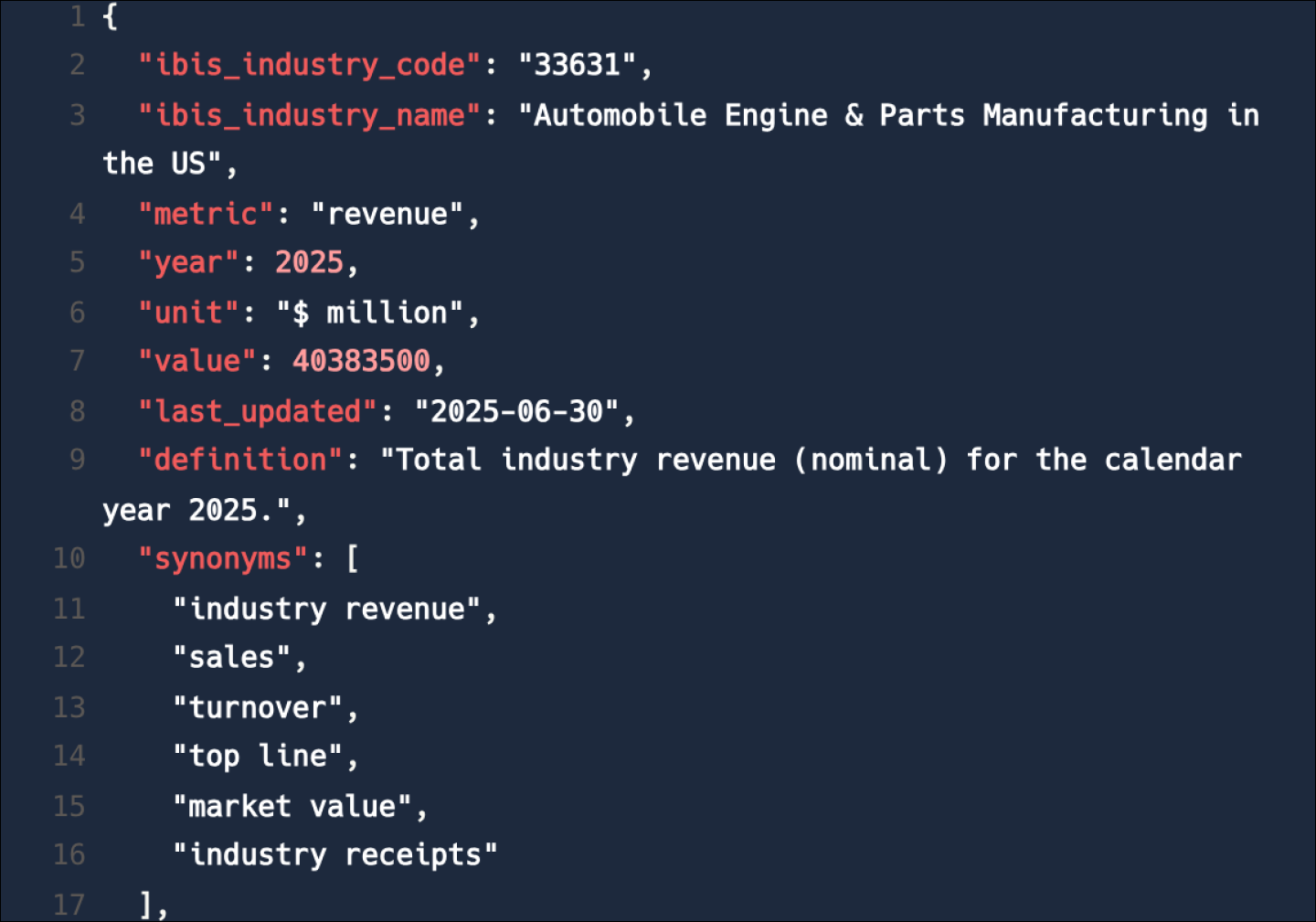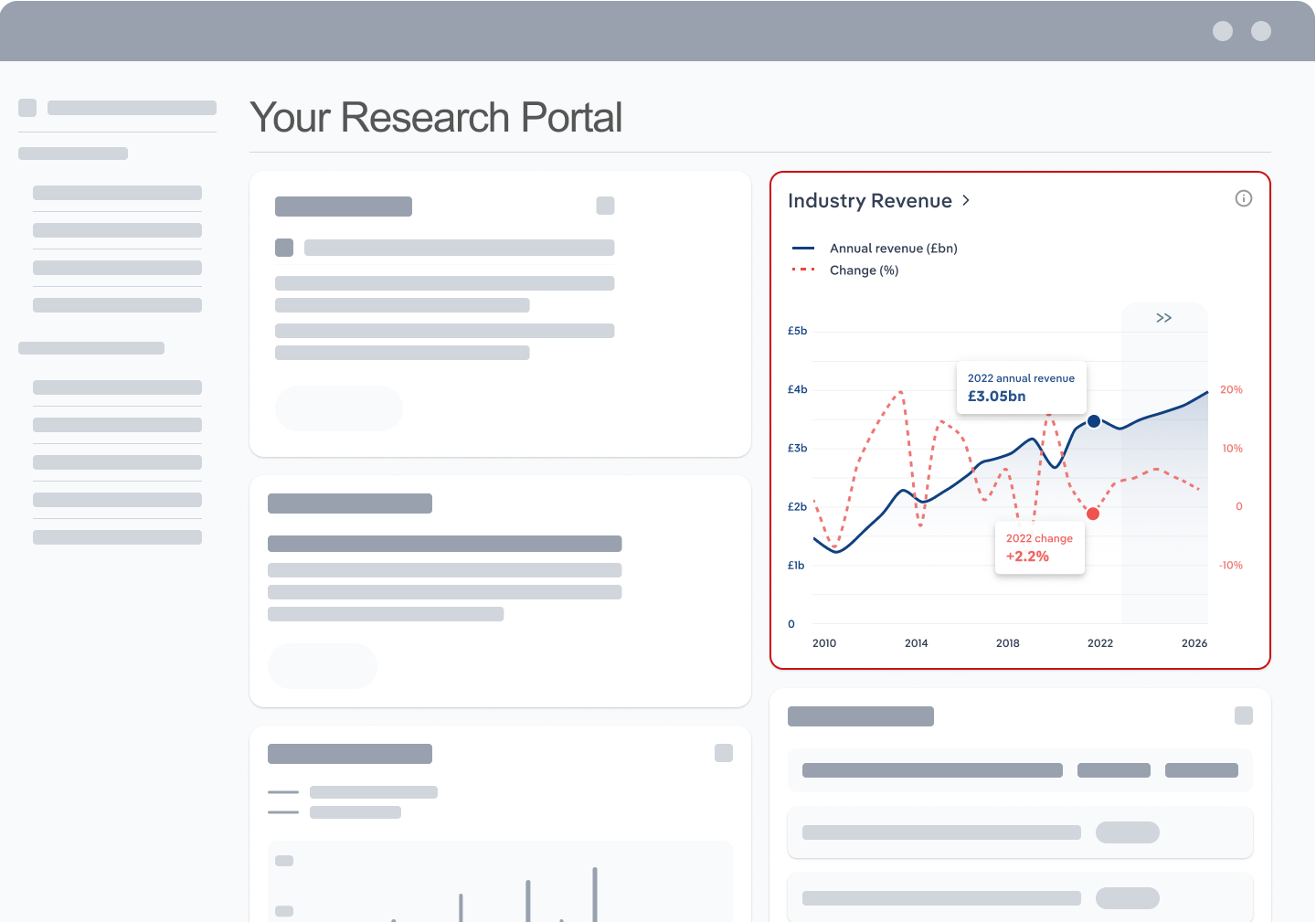Industry Statistics and Trends
Market size and recent performance (2015-2030)
Industry revenue has grown at a CAGR of 23.2 % over the past five years, to reach an estimated $8.2bn in 2025.
Trends and Insights
Rising disposable income is positive for the industry
- Disposable household income in China has improved significantly in recent years due to the rapid development of China's economy.
- Additional trends and insights available with purchase
Industry outlook (2025-2030)
Market size is projected to grow over the next five years.
Trends and Insights
The number of moviegoers has soared since many of the COVID-19 restrictions were lifted
- Demand for film watching is forecast to surge after the country recovers from COVID-19.
Biggest companies in the Cinemas in China
| Company | Market Share (%)
2025 | Revenue ($m)
2025 |
|---|---|---|
Dalian Wanda Group Inc., Ltd. | 1,972.4 | |
China Film Group Corporation | 558.8 | |
Guangdong Dadi Cinema Circuit Co. Ltd. | 539.7 |
To view the market share and analysis for all 10 top companies in this industry, view purchase options.
Products & Services Segmentation
Industry revenue is measured across several distinct product and services lines, including Chinese films, Foreign films and Snacks and drinks. Chinese films is the largest segment of the Cinemas in China.
Trends and Insights
The market share of Chinese films has increased
- Chinese movies are movies that are released in mainland China, Hong Kong and Taiwan.
- More insights available in the full report
Table of Contents
About this industry
Industry definition
The Cinema industry in China screens films and other videos to a paying audience. The industry's establishments include cinemas, auditoriums, open-air movie theaters and video theaters.
What's included in this industry?
Products and services covered in the Cinemas industry in China include Chinese films, Foreign films and Snacks and drinks.Companies
Companies covered in the Cinemas industry in China include Dalian Wanda Group Inc., Ltd., China Film Group Corporation and Guangdong Dadi Cinema Circuit Co. Ltd.Purchase this report to view all 10 major companies in this industry.
Related Terms
Related terms covered in the Cinemas industry in China include film screening, video screening and box office.Performance
Get an indication of the industry's health through historical, current and forward-looking trends in the performance indicators that make or break businesses.
Analyst insights
Industry demand is expected to surge. After the COVID-19 epidemic is brought under control and cinemas return to normal business as well as consumer stimulus.
In this chapter (4)
- Current Performance
- Outlook
- Volatility
- Life Cycle
Key metrics
- Annual Revenue, Recent Growth, Forecast, Revenue Volatility
- Number of Employees, Recent Growth, Forecast, Employees per Business, Revenue per Employee
- Number of Businesses, Recent Growth, Forecast, Employees per Business, Revenue per Business
- Total Profit, Profit Margin, Profit per Business
Charts
- Revenue, including historical (2015-2024) and forecast (2025-2030)
- Employees, including historical (2015-2024) and forecast (2025-2030)
- Businesses, including historical (2015-2024) and forecast (2025-2030)
- Profit, including historical (2015-2025)
- Industry Volatility vs. Revenue Growth
- Industry Life Cycle
Detailed analysis
- Trends in supply, demand and current events that are driving current industry performance
- Expected trends, economic factors and ongoing events that drive the industry's outlook
- Key success factors for businesses to overcome volatility
- How contribution to GDP, industry saturation, innovation, consolidation, and technology and systems influence the industry's life cycle phase.
Products and Markets
Learn about an industry's products and services, markets and trends in international trade.
Analyst insight
The quality of Chinese films has improved. The share of Chinese films in the industry has grown significantly as the overall quality of films in the industry has improved.
In this chapter
- Products & Services
- Major Markets
Key metrics
- Largest market segment and value in 2025
- Product innovation level
Charts
- Products & services segmentation in 2025
- Major market segmentation in 2025
Detailed analysis
- Trends impacting the recent performance of the industry's various segments
- Innovations in the industry's product or service offering, specialization or delivery method
- Key factors that successful businesses consider in their offerings
- Buying segments and key trends influencing demand for industry products and services
Geographic Breakdown
Discover where business activity is most concentrated in an industry and the factors driving these trends to find opportunities and conduct regional benchmarking.
Analyst insights
There are more screens in Beijing than anywhere else in China. The capital has more policy support and more rapid technological development, which also stimulates competition...
In this chapter (1)
- Business Locations
Charts
- Share of revenue, establishment, wages and employment in each region
- Share of population compared to establishments in each region in 2025
Tables
- Number and share of establishments in each region in 2025
- Number and share of revenue each region accounts for in 2025
- Number and share of wages each region accounts for in 2025
- Number and share of employees in each region in 2025
Detailed analysis
- Geographic spread of the industry across Asia Pacific, and trends associated with changes in the business landscape
- Key success factors for businesses to use location to their advantage
Competitive Forces
Get data and insights on what's driving competition in an industry and the challenges industry operators and new entrants may face, with analysis built around Porter's Five Forces framework.
Analyst insights
Low prices are good for competition in the industry. Consumers are often more willing to go to cheaper cinemas, which means keeping ticket costs low should be high priority f...
In this chapter (4)
- Concentration
- Barriers to Entry
- Substitutes
- Buyer & Supplier Analysis
Key metrics
- Industry concentration level
- Industry competition level and trend
- Barriers to entry level and trend
- Substitutes level and trend
- Buyer power level and trend
- Supplier power level and trend
Charts
- Market share concentration among the top 4 suppliers from 2020-2025
- Supply chain including upstream supplying industries and downstream buying industries, flow chart
Detailed analysis
- Factors impacting the industry’s level of concentration, such as business distribution, new entrants, or merger and acquisition activity.
- Key success factors for businesses to manage the competitive environment of the industry.
- Challenges that potential industry entrants face such as legal, start-up costs, differentiation, labor/capital intensity and capital expenses.
- Key success factors for potential entrants to overcome barriers to entry.
- Competitive threats from potential substitutes for the industry’s own products and services.
- Key success factors for how successful businesses can compete with substitutes.
- Advantages that buyers have to keep favorable purchasing conditions.
- Advantages that suppliers have to maintain favorable selling conditions.
- Key success factors for how businesses can navigate buyer and supplier power.
Companies
Learn about the performance of the top companies in the industry.
Analyst insights
Cinema renovation and upgrading. Not only the introduction of the industry's top equipment and the latest technology, but also increase the leisure space.
In this chapter
- Market Share Concentration
- Companies
- Company Spotlights
Charts
- Industry market share by company in 2021 through 2025
- Major companies in the industry, including market share, revenue, profit and profit margin in 2025
- Overview of Dalian Wanda Group Inc., Ltd.'s performance by revenue, market share and profit margin from 2019 through 2025
- Overview of China Film Group Corporation's performance by revenue, market share and profit margin from 2019 through 2025
- Overview of Guangdong Dadi Cinema Circuit Co. Ltd.'s performance by revenue, market share and profit margin from 2019 through 2025
- Overview of revenue, market share and profit margin trend for 7 additional companies
Detailed analysis
- Description and key data for Dalian Wanda Group Inc., Ltd., and factors influencing its performance in the industry
- Description and key data for China Film Group Corporation, and factors influencing its performance in the industry
- Description and key data for Guangdong Dadi Cinema Circuit Co. Ltd., and factors influencing its performance in the industry
- Description, key data and performance trends for 7 additional companies
External Environment
Understand the demographic, economic and regulatory factors that shape how businesses in an industry perform.
Analyst insights
Disposable income is up. Rising levels of household disposable income mean consumers have more money available for industrial film screening services.
In this chapter
- External Drivers
- Regulation & Policy
- Assistance
Key metrics
- Regulation & policy level and trend
- Assistance level and trend
Charts
- Regulation & Policy historical data and forecast (2015-2030)
- Assistance historical data and forecast (2015-2030)
Detailed analysis
- Demographic and macroeconomic factors influencing the industry, including Regulation & Policy and Assistance
- Major types of regulations, regulatory bodies, industry standards or specific regulations impacting requirements for industry operators
- Key governmental and non-governmental groups or policies that may provide some relief for industry operators.
Financial Benchmarks
View average costs for industry operators and compare financial data against an industry's financial benchmarks over time.
Analyst insights
COVID-19 pandemic has had a big impact on industry profits. Profits will grow in the coming years as the industry recovers.
In this chapter
- Cost Structure
- Financial Ratios
- Key Ratios
Key metrics
- Profit margin, and how it compares to the sector-wide margin
- Average wages, and how it compares to the sector-wide average wage
- Largest cost component as a percentage of revenue
- Industry average ratios for days' receivables, industry coverage and debt-to-net-worth ratio
Charts
- Average industry operating costs as a share of revenue, including purchases, wages, depreciation, utilities, rent, other costs and profit in 2025
- Average sector operating costs as a share of revenue, including purchases, wages, depreciation, utilities, rent, other costs and profit in 2025
- Investment vs. share of economy
Data tables
- Cash Flow & Debt Service Ratios (2015-2030)
- Revenue per Employee (2015-2030)
- Revenue per Enterprise (2015-2030)
- Employees per Establishment (2015-2030)
- Employees per Enterprise (2015-2030)
- Average Wage (2015-2030)
- Wages/Revenue (2015-2030)
- Establishments per Enterprise (2015-2030)
- IVA/Revenue (2015-2030)
- Imports/Demand (2015-2030)
- Exports/Revenue (2015-2030)
Detailed analysis
- Trends in the cost component for industry operators and their impact on industry costs and profitability
Key Statistics
Industry Data
Data Tables
Including values and annual change:
- Revenue (2015-2030)
- IVA (2015-2030)
- Establishments (2015-2030)
- Enterprises (2015-2030)
- Employment (2015-2030)
- Exports (2015-2030)
- Imports (2015-2030)
- Wages (2015-2030)
Top Questions Answered
Unlock comprehensive answers and precise data upon purchase. View purchase options.
What is the market size of the Cinemas industry in China in 2025?
The market size of the Cinemas industry in China is $8.2bn in 2025.
How many businesses are there in the Cinemas industry in China in 2025?
There are 1,882 businesses in the Cinemas industry in China, which has declined at a CAGR of 0.5 % between 2020 and 2025.
How may import tariffs affect the Cinemas industry in China?
The Cinemas industry in China is unlikely to be materially impacted by import tariffs with imports accounting for a low share of industry revenue.
How may export tariffs affect the Cinemas industry in China?
The Cinemas industry in China is unlikely to be materially impacted by export tariffs with exports accounting for a low share of industry revenue.
Has the Cinemas industry in China grown or declined over the past 5 years?
The market size of the Cinemas industry in China has been growing at a CAGR of 23.2 % between 2020 and 2025.
What is the forecast growth of the Cinemas industry in China over the next 5 years?
Over the next five years, the Cinemas industry in China is expected to grow.
What are the biggest companies in the Cinemas industry in China?
The biggest companies operating in the Cinemas industry in China are Dalian Wanda Group Inc., Ltd., China Film Group Corporation and Guangdong Dadi Cinema Circuit Co. Ltd.
What does the Cinemas industry in China include?
Chinese films and Foreign films are part of the Cinemas industry in China.
Which companies have the highest market share in the Cinemas industry in China?
The company holding the most market share in the Cinemas industry in China is Dalian Wanda Group Inc., Ltd..
How competitive is the Cinemas industry in China?
The level of competition is high and increasing in the Cinemas industry in China.
Methodology
How are IBISWorld reports created?
IBISWorld has been a leading provider of trusted industry research for over 50 years to the most successful companies worldwide. With offices in Australia, the United States, the United Kingdom, Germany and China, we are proud to have local teams of analysts that conduct research, data analysis and forecasting to produce data-driven industry reports.
Our analysts start with official, verified and publicly available sources of data to build the most accurate picture of each industry. Analysts then leverage their expertise and knowledge of the local markets to synthesize trends into digestible content for IBISWorld readers. Finally, each report is reviewed by one of IBISWorld’s editors, who provide quality assurance to ensure accuracy and readability.
IBISWorld relies on human-verified data and human-written analysis to compile each standard industry report. We do not use generative AI tools to write insights, although members can choose to leverage AI-based tools within the platform to generate additional analysis formats.
What data sources do IBISWorld analysts use?
Each industry report incorporates data and research from government databases, industry-specific sources, industry contacts, and our own proprietary database of statistics and analysis to provide balanced, independent and accurate insights.
Key data sources in China include:
- National Bureau of Statistics China
- General Administration of Customs
- People’s Bank of China
Analysts also use industry specific sources to complement catch-all sources, although their perspective may focus on a particular organization or representative body, rather than a clear overview of all industry operations. However, when balanced against other perspectives, industry-specific sources provide insights into industry trends.
These sources include:
- Industry and trade associations
- Industry federations or regulators
- Major industry players annual or quarterly filings
Finally, IBISWorld’s global data scientists maintain a proprietary database of macroeconomic and demand drivers, which our analysts use to help inform industry data and trends. They also maintain a database of statistics and analysis on thousands of industries, which has been built over our more than 50-year history and offers comprehensive insights into long-term trends.
How does IBISWorld forecast its data?
IBISWorld’s analysts and data scientists use the sources above to create forecasts for our proprietary datasets and industry statistics. Depending on the dataset, they may use regression analysis, multivariate analysis, time-series analysis or exponential smoothing techniques to project future data for the industry or driver. Additionally, analysts will leverage their local knowledge of industry operating and regulatory conditions to impart their best judgment on the forecast model.
IBISWorld prides itself on being a trusted, independent source of data, with over 50 years of experience building and maintaining rich datasets and forecasting tools. We are proud to be the keystone source of industry information for thousands of companies across the world.
Learn more about our methodology and data sourcing on the Help Center.










